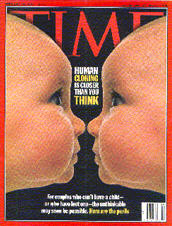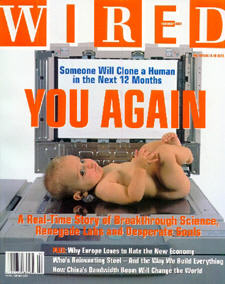 |

 Introduces Idea of Gay-Lesbian Human Cloning Support Full Equality Coverage in its Focus on 'Infertile Couples' |
|
Compiled by GayToday
To its credit, Time explains to its readers that many of those who hope to be cloned are simply ordinary people attempting solutions to very human circumstances—such as being infertile or having recently lost a child or loved one. Time also noted that the arrival of cloned children "will shift forever our understanding of the relationship between parents and children, means and ends, ends and beginnings". It then led into a discussion as to whether "it is the technology that alarms us or just certain ways of using it." Gay Today's contributing writer Randolfe Wicker was one of the first "cloning applicants" profiled, including a quarter-page color photograph of the gay and lesbian media pioneer (circa 1962) now a founding father of the human cloning activist movement. TIME reports: "As a gay man, Wicker has long been frustrated that he cannot readily have children of his own; as he gets older, his desire to reproduce grows stronger." This, says Wicker is TIME's assessment not his own. "At best, as I have grown older," he says, " I realize that I made a choice not to have a family and that my options in that regard are now past." TIME then goes on to describe Wicker's impressions of what he and his later-born twin would share—
Wicker, critiquing the TIME article continues: "Even with the carefully chosen term 'imprint not in sand but in cement' (chosen since anyone knows that cement wears and crumbles with age also--just more slowly than an imprint in sand that can be wiped out seconds later by a wave or in a few minutes by blowing wind) TIME slides into quoting Bioethicist Arthur Caplan saying that 'cloning can't make you immortal..'-- "Indeed, the TIME article was filled with such 'slippery' continuity. "To its credit, TIME points out that the very idea of transplanting a heart was terrifying not too long ago and IVF was outlawed in many states just 20 years ago and that perhaps attitudes might change with the passage of time. "Then TIME introduced several infertile couples seeking to reproduce through cloning. Christine DeShazo and her partner Michele Thomas of Miramar, Florida were presented as a lesbian couple seeking to reproduce through cloning. "At least in the 'infertile couples department' gay couples were treated as full equals. "Because they have already been ostracized as homosexuals, they aren't worried about the added social sting that would come with cloning>" TIME reported and then continued quoting Michele Thomas "Now (people) would say, 'Not only are you a lesbian, you are a cloning lesbian."
"TIME treated the Raelians, a religious cult which among other things has tried to merchandise the ability to clone a child for gay couples sharing both their genes (an impossibility today), very gently. "The libertarian idea that people should be free of governmental interference in their reproductive choices got decent exposure. However, the discredited idea that Dolly is seven years older than she appears was tossed in. (Dolly had triplets a few months ago, something extraordinary for a sheep nearing the end of its possible lifetime). "Dr. Gregory Pence, a pro-cloning ethicist from the University of Alabama Medical School pointed out that people had children for the wrong reasons all the time and wondered why so many worried about the cloning of humans while so many pregnant women smoked and drank alcohol which put their unborn children at great risk. "Some more conservative activists were upset by TIME's coverage of a man who wanted to save his dying mother's cells for possible future cloning. Likewise, some felt that a 36-year-old 'happily unmarried' man who wanted to clone himself so he would know exactly what he was getting was "beyond the pail". "The statistics that TIME published were grim indeed. 90% supposedly opposed human cloning. Overwhelming majorities also opposed the cloning of animals and of using cloning to enable infertile couple to have children. One can only wonder how such questions were phrased. "For instance on the 'cloning of animals question'--Were people asked the relevant question: 'Do you support the cloning of animals that have been genetically engineered to produce live saving medicines for humans in their milk since such animals, if bred, would lose this genetically engineered capacity?' "Of course, TIME Magazine is 'media' functioning in the framework of the overall culture. If ancient Rome had a TIME Magazine, it would have uncritically covered "the fun folks had watching those annoying Christians being fed to the lions". With mountains of moral condemnation incorporated in its article, TIME described 'cloners' as trying to climb onto the mainstream scientist train and ride it to 'a public relations victory' using the promise of stem cell research. Stem cell researchers were quoted as vigorously opposed to and terrified by, even angry at, those supporting human cloning. "TIME summarized its article succinctly in its concluding paragraph: " 'The short answer to the cloning question,' says ethicist Caplan, 'is that anybody who clones somebody today should be arrested. It would be barbaric human experimentation. It would be killing fetuses and embryos for no purpose, none, except for curiosity.' "But if you can't agree that that's wrong to do, and if the media can't agree to condemn rather than gawk," TIME's article concluded, 'that's a condemnation of us all.' " 'Just curiosity'?" laments Randolfe Wicker. He explodes in a critique of this last conclusion which, he points out, contradicts TIME's own foregoing copy: "What about allowing infertile couples," he asks, " including gay ones to have children of their own? In fact, 'just curiosity' was not the motivation of any of the cloning advocates covered by the article. "The folks in the article simply wanted to bear children, dreamed of rearing later-born twins of loved ones or of simply wanted to leave a 'footprint in cement' so as not to instantly disappear at the moment of death, just as many couples feel that 'they live on in their children'. These were real motivations driving people to extraordinary means. "Somehow, 'just curiosity' seemed like a sloppy, inaccurate, nonsensical common denominator." |

 New York, New York--In a major current cover story titled "Human Cloning: Its Closer than You Think" TIME magazine's twelve different reporters have produced a tour de force of human cloning that is balanced in some ways, backward-looking in others and forward-looking in at least a few respects.
New York, New York--In a major current cover story titled "Human Cloning: Its Closer than You Think" TIME magazine's twelve different reporters have produced a tour de force of human cloning that is balanced in some ways, backward-looking in others and forward-looking in at least a few respects.
